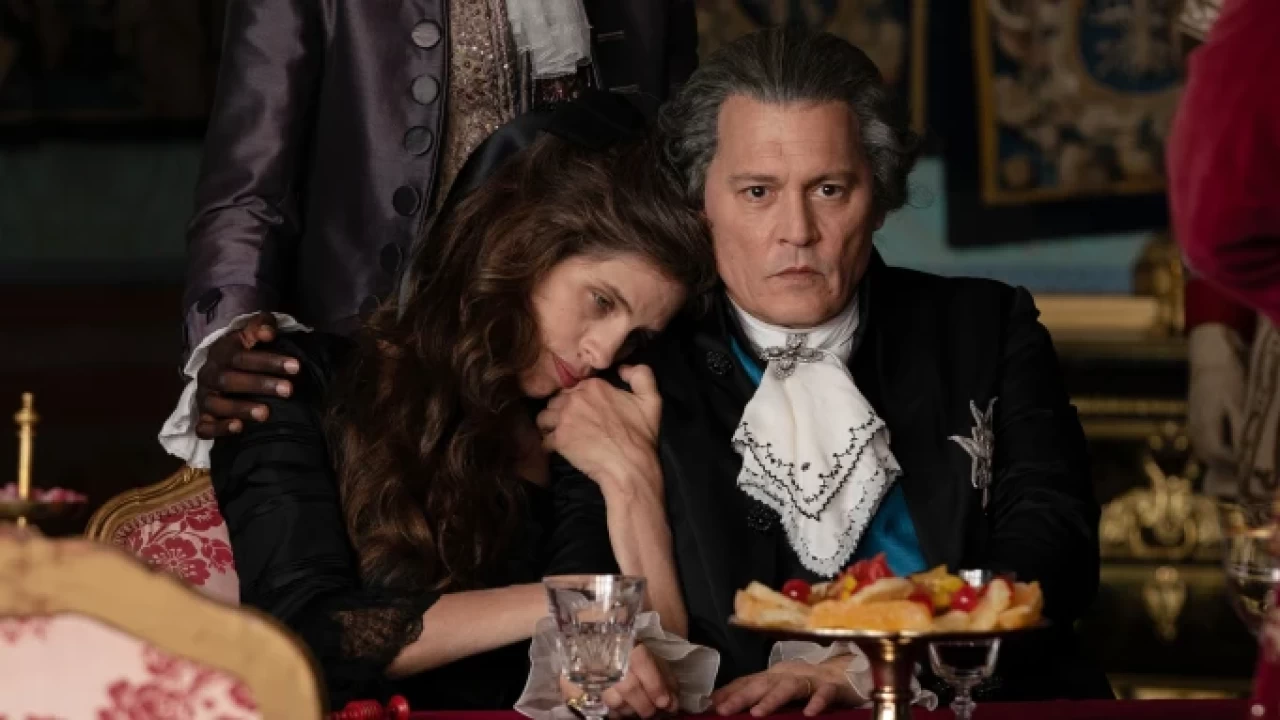The courtiers of Louis XV are outraged when his new mistress, Countess Jeanne du Barry, defies societal norms by looking him in the eye. This scandalous affair between the king and a commoner is filled with taboo-breaking acts, such as Jeanne's lack of title, her audacious behavior, and her unconventional dress sense. It's no wonder that Maïwenn, a controversial French director, chose to cast herself alongside Johnny Depp in a film that explores class, status, and the self-destructive tendencies of its central characters.
Through the story of Jeanne du Barry, the film also examines French cultural perspectives on sexual impropriety. While the Cannes Film Festival seems oblivious to the issue of cancel culture, Maïwenn's latest feature, which coincides with its local release, sheds light on the intriguing tolerance the French have historically shown towards infidelity and sexual escapades among their own.
While not immediately apparent, parallels with Sofia Coppola's 2006 film Marie Antoinette become evident in Maïwenn's work. However, the French director takes a different approach and avoids descending into post-modernism. This is evident from the opening credits, which feature Maïwenn and Depp in a Bonnie and Clyde-style presentation, accompanied by Stephen Warbeck's rich and period-appropriate score, setting the tone for the opulent life that awaits the protagonist. Initially, the film bears a resemblance to Tony Richardson's 1963 comedy Tom Jones, with a gender-swapped twist, drawing inspiration from Henry Fielding's bawdy 18th-century novel. Surprisingly, the comedy in this film about sex is more subtle and less overtly seductive.

The irresistible rise of Jeanne Vaubernier (played by Maïwenn) also echoes elements of Voltaire's novel Candide. Born as the illegitimate child of a monk and a cook, Jeanne emerges from humble beginnings. The narrator reveals that girls who come from nothing are ready for anything. Jeanne's journey unfolds through two actresses portraying her upbringing, starting with her early life under the patronage of a broad-minded nobleman, her scandalous expulsion from a convent due to her forbidden book reading, which exposed her to the captivating power of eroticism. From there, she embarks on her journey to Paris, the "Capital of hope and all danger," where she ascends the social ladder under her mother's watchful eye.
The narrative gains momentum when Jeanne, now portrayed by Maïwenn, encounters the charismatic and notorious playboy, Count du Barry (Melvil Poupaud), who proposes a partnership. However, their arrangement quickly turns sour as the Count insists on flaunting his extramarital affairs. Despite the deteriorating situation, Jeanne remains with him for the sake of his son. At this point, the Count becomes more of a pimp than a lover, and his ambitions for Jeanne reach the highest level: "The King! The King!" she exclaims, recognizing his obsession. But the Count is not the sole pursuer; the cunning Duc de Richelieu (Pierre Richard) also sees her as worthy of the royal bed. Enter La Borde (Benjamin Lavernhe), a palace insider who guides Jeanne through the intricate court rituals and facilitates the connection.
Around the 20-minute mark, Johnny Depp makes his mostly silent debut with a grand entrance that is simultaneously impressive and unsettling. It is as if Edward Scissorhands' gothic aesthetics have been applied to the tired and bloated face of Captain Kurtz from Apocalypse Now. Will this be a Brando-esque cameo? Surprisingly, no. Depp remains as Louis XV throughout the film. The accuracy of his accent is a subject for Francophones to debate, and his role is notably light on dialogue. Nevertheless, Maïwenn skillfully capitalizes on Depp's visual acting skills. In what could be considered the film's standout scene, Jeanne observes from behind a two-way mirror as the king's advisors enter his bedroom to awaken, bathe, and shave him before granting an audience to his three daughters. Depp's deadpan expression is priceless, conveying despairing looks to the woman watching from behind the glass.
Maïwenn's film is replete with such captivating moments (including a hilariously recurring joke about leaving the king's presence), and the choice to film pivotal scenes in Versailles adds an immersive authenticity. Similar to the Cannes Film Festival, an emblem of extravagance where its inhabitants weren't always attuned to the shifting political landscape, the film captures a sense of opulence. The costume design goes beyond the requirements of a period drama, particularly when Jeanne elevates her sartorial choices, undergoing more costume changes in a weekend than Katy Perry during a Super Bowl halftime show. Moreover, the hairstyles in the film reach heights not seen since John Waters' original 1988 "Hairspray."
Despite the grandeur and spectacle, it becomes apparent that the story lacks cohesion. It unfolds as a series of vignettes, giving the impression of glimpsing scenes from a life in retrospect rather than fully immersing ourselves in a wild and vibrant existence. This feeling is particularly pronounced when Marie-Antoinette enters the picture. Encouraged by Louis XV's delightfully catty daughters, the future Dauphin's wife wields significant power and holds the ability to exile Jeanne. However, the drama feels oddly stagnant, and what starts with great energy and promise ultimately descends into prolonged and hollow pomp.
The novelty of witnessing Johnny Depp in his first post-trial role will undoubtedly generate international curiosity. Yet, the film boasts a formidable cast that more than supports him. Notably, Poupaud shines as the cunning du Barry, Lavernhe charms as the amiable La Borde, and the wonderfully named India Hair portrays Adélaïde, one of the king's insufferable daughters. Maïwenn herself delivers a commendable performance, defying expectations by portraying Jeanne not as an ego-driven character but by highlighting the tumultuous love affair between a king and his courtesan. However, the on-screen passion falls short, leaving us longing for a deeper connection. If Jeanne du Barry truly ascended through a series of scandalous encounters and met an early demise marked as "sin incarnate," then this rendition must surely be the tamer, PG version.


0 Comments